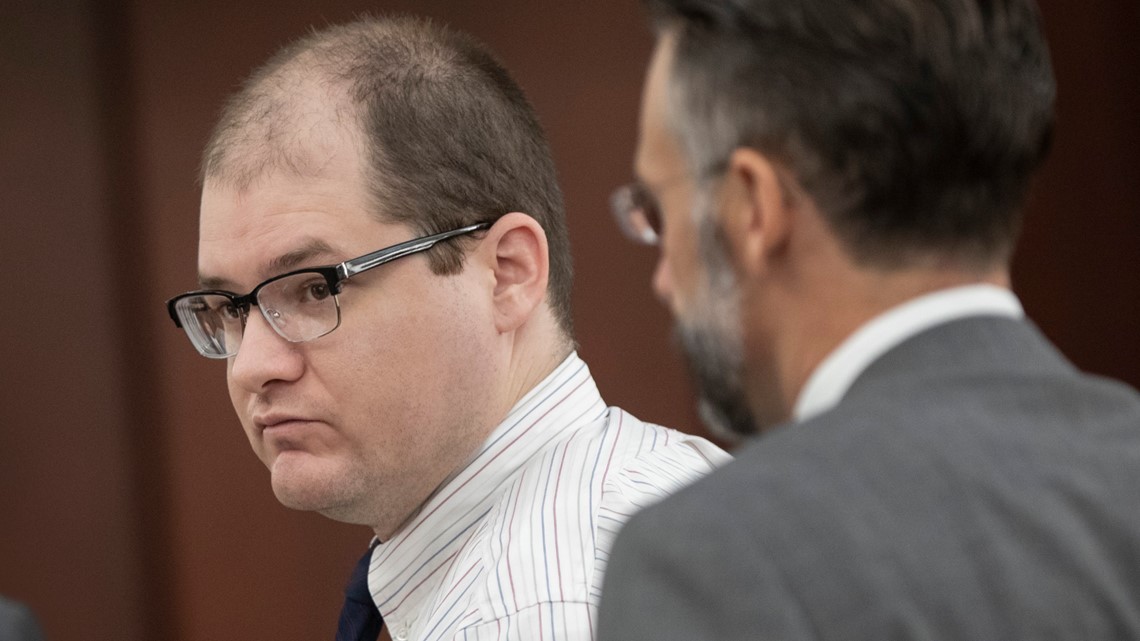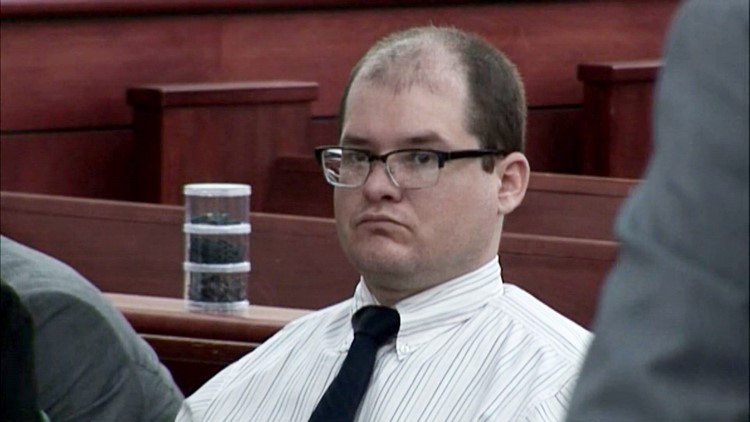LEXINGTON, S.C. — The defense has rested its case in the trial of Timothy Jones Jr., the South Carolina man who killed his five children.
The announcement came at the end of a long day of testimony Friday from an expert who said the defendant is mentally ill.
The judge said a prosecution rebuttal witness will take the stand Monday when the trial resumes, and then closing arguments will take place.
Jones has admitted to killing his five children — Abigail Elaine, 1; Gabriel, 2; Nahtahn, 6; Elias, 7; and Mera Gracie, 8 — on Aug. 28, 2014, after picking them up from school and daycare and has pled guilty by reason of insanity. Prosecutors are seeking the death penalty.
Friday morning’s defense witness testimony included Dr. Beverly Wood, chief of psychiatry at South Carolina Department of Corrections, and Dr. Julie Dorney, a forensic psychiatrist from Atlanta.
Dr. Wood treated Jones during his incarceration at Kirkland and Lee detention centers in Sept. 2014 to December 2018, before his transfer to Lexington.
Jones gave self-reported history of mother’s schizophrenia, drug (cocaine, marijuana, synthetic marijuana) and alcohol abuse, his car accident and resulting brain trauma, depression, paranoia, hallucinations, and hearing voices.
Based on mental status exam, Woods diagnosed Jones with schizo-affective disorder — not a full-blown psychotic break.
She believes Jones is mentally ill. When defense attorney Boyd Young asked Wood if she thought Jones was faking his illness, she responded she thought it might have been a possibility, but no. Nothing in his actions that would suggest it; Jones would never have reached the level of medicine dosage if he were faking.
The doctor testified that she met Jones consistently every week or every other week, then less frequently, for four years.
On cross-examination by Deputy Solicitor Suzanne Mayes, Woods said that her role is to determine what issues an inmate may have once they get to prison — deal with the symptoms, not crime. A forensic psychiatry is different — in that job, the doctor reviews materials involved in the crime in order to render an opinion as to if that person knew legally and morally right from wrong
Woods testified that she was not in court to give opinion of Jones’ state of mind on August 28, 2014.
Dr. Dorney was contacted by defense team in July 2017 to look at Jones’ case file and offer an opinion on whether Jones knew right from wrong when he killed his children on August 28, 2014.
It is her opinion that — related to the death of Nahtahn — Tim Jones did not recognize legal right from wrong. As to the deaths of the other four children, it is Dorney’s opinion that Jones could not distinguish moral right from wrong, but could distinguish legal right from wrong.
Dorney’s testimony contradicts, in part, testimony heard by the court-appointed psychiatrist, Dr. Richard Frierson. On Thursday, Frierson testified that it was his opinion that Jones — at the time of the killings on August 28, 2014 — would have been able to distinguish legal and moral right from legal and moral wrong and would have known what he did was wrong.
Dorney based her findings on medical records and interviews, reports from law enforcement and doctors; she looked at Jones’ family and social history, and events up to and following the August 2014 incident, up to today.
She met with Jones eight times from 2017 to May 2019 (after submitting her report). Her last visit in May was to make sure Jones was competent to stand trial.
In forming her opinion, Dorney testified that Jones’ head injury — suffered from an accident when Tim was 15 — definitely caused limits in the executive functioning of his brain; his Spice use was a significant contributing factor in Jones’ reported paranoia and hallucinations.
When interviewing him in prison, Dorney testified that Jones was very organized in his thinking when talking to her.
The doctor testified under cross-examination by Deputy solicitor Shawn Graham that, while she relied on Dr. Wood’s diagnosis (because Wood had most contact with Jones) and Wood’s report had significant weight in her decision, Dorney made her own diagnosis.
Dorney diagnosed Jones with schizo-affective disorder, with a bi-polar disorder.


Dorney said that Jones told her this account of the events: In mid-August 2014, Jones complains of getting little sleep, having racing thoughts, irritability, easily agitated, depressed about marriage and not attending church, missed work, using Spice up to 5 times a day.
What triggered Jones: on Aug. 28, 2014, he says he had gone to work, picked up the kids, used spice 3 times, got angry with Nahtahn, pressured Nahtahn about busted electrical sockets. Amber called and Nahtahn told her what happened. Tim cursed at Amber, began PT of Nahtahn, spanked Nahtahn, sent the boy to bed. He later went to check on the boy and shook him, realized Nahtahn dead, began to wonder what would happen to kids if he went to prison — he thought he couldn’t depend on Amber to care for the kids.
Jones told Elias and Mera that Nahtahn was dead. He left the house with Mera and bought cigarettes around 1 a.m. Jones says on the drive back home, he heard a voice that told him to kill the kids — he believed the kids would be better off in heaven and thought he’d send them to the other side where they could be together. There were no other options. Jones said he didn’t think about taking the children to live with his father Tim Jones Sr or his grandmother Roberta Thornsberry.
Jones said he smoked Spice before he killed Mera and Elias with his hands and strangled Gabriel and Abigail with a belt. Jones tells Dorney that Elias said “Dad take me with you,” Mera resisted, and Gabriel told him he loved him.
Jones said that after he killed the children, he tried to overdose on Spice.
When that didn’t work, he drove aimlessly, thought of escape to Mexico and Las Vegas. He wrapped the bodies of his children in sheets and blankets and put them back of SUV where they stayed for days before disposal in the woods in Alabama.
Dorney testified to how Jones presented himself to her during her visits:
- August — Oct 2017 (her first four visits): Jones was not complaining of any psychotic symptoms, appeared stable on medication
- Fall 2018: Jones’ dosage and medications had changed and Jones has withdrawal symptoms and mood swings
- March -April 2019: Jones was put on a mood stabilizer
- May 2019: Jones reportedly begins to hear voices again
>>>>>>>>>>>>> THE CHARGES
Jones has admitted to killing his children — Abigail Elaine, 1; Gabriel, 2; Nahtahn, 6; Elias, 7; and Mera Gracie, 8 — on Aug. 28, 2014, after picking them up from school and daycare. The killings took place at the family home at 2155-B South Lake Dr. in Red Bank.
He was arrested on Sept. 6, 2014, after a traffic safety stop in Smith County, Mississippi, during which law enforcement officers discovered blood and handwritten notes on how to mutilate bodies in Jones’ car. Jones had left the children’s bodies in plastic trash bags in a wooded area outside of Camden, Alabama. He had been traveling throughout the South with the bodies in the back of his car since Aug. 28.
Jones has pled guilty by reason of insanity. His guilty plea would allow one of four possible outcomes in the trial: guilty, guilty by reason of insanity, not guilty by mental defect, or not guilty.
If found guilty, the death penalty would not be automatic. Jurors would then be asked to consider extenuating circumstances and could sentence Jones to life without parole rather than death.



